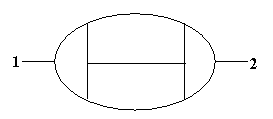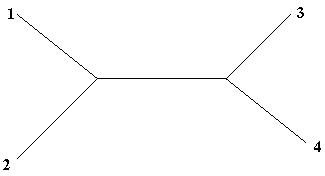
The way path integrals are used in quantum field theory is, very roughly
speaking, that the probability amplitude of a process going from point
v1
to point v2
is an integral over all possible ways of getting from
v1 to
v2.
In our finite-dimensional model, each of these
``ways'' is represented by a point
v
in
Rn
and
the probability measure assigned to that way is
![]() . The integral is
what we called before a 2-point function
. The integral is
what we called before a 2-point function

We continue with the example of the cubic potential

In terms of Wick's Theorem and our graph interpretation of pairings, this becomes:


The k-point correlation functions are similarly defined and calculated. Here is where we begin to see the usual ``Feynman diagrams.''

|
|
|
© Copyright 2001, American Mathematical Society |